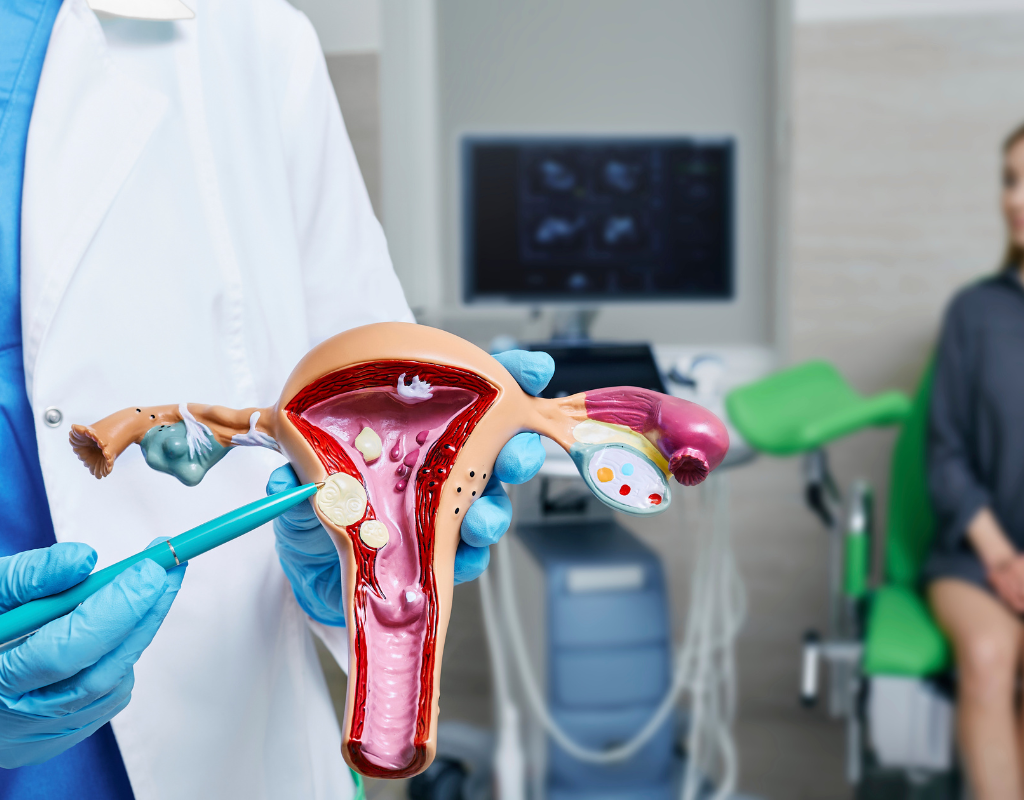Uterine fibroids are a common condition that affects many women. While they are usually benign, they can cause discomfort, pain, and other symptoms. In this blog post, we’ll discuss what fibroids are, their symptoms and causes, available treatments, and whether it is necessary to have fibroids treated.
What Are Fibroids, The Symptoms, And What Causes Them?
Fibroids are non-cancerous growths that develop in the uterus. They can be as small as a pea or as large as a grapefruit and can cause a variety of symptoms such as heavy menstrual bleeding, pelvic pain, and discomfort during sex. The exact cause of fibroids is still unknown, but research suggests that genetics and hormones may play a role.
Symptoms of fibroids can include:
- Heavy or prolonged menstrual periods
- Pelvic pain or pressure
- Frequent urination
- Difficulty emptying the bladder
- Constipation
- Backache or leg pain
- Painful intercourse
While fibroids can cause significant discomfort and pain, not all women experience symptoms. Fibroids can also grow and shrink over time, and some women may not even realize they have them until they undergo a routine gynecological exam.
What Are The Options For Fibroid Removal Surgery?
If fibroids are causing significant symptoms, surgery may be necessary. There are several surgical options for fibroid removal, including myomectomy, hysterectomy, and uterine artery embolization.
Myomectomy: Myomectomy involves removing the fibroids while leaving the uterus intact. This procedure is usually recommended for women who still wish to have children, as it preserves the uterus. Recovery time varies, but most women can return to normal activities within a month or two.
Hysterectomy: Hysterectomy involves removing the entire uterus, and is typically recommended for women who have completed childbearing. Recovery time for a hysterectomy is longer than for a myomectomy, and women may need to take several weeks off work to recover.
Uterine artery embolization: This procedure involves blocking the blood vessels that supply the fibroids, causing them to shrink and die off. Recovery time is typically shorter than for surgery, and women can usually return to normal activities within a few days to a week.
Your Road to Recovery After Fibroid Removal Surgery
Recovery time after fibroid removal surgery varies depending on the type of surgery performed. Myomectomy and uterine artery embolization are minimally invasive procedures and typically require less recovery time compared to a hysterectomy.

Patients may experience some discomfort, bleeding, and fatigue after the procedure, but most can return to normal activities within a few days to a few weeks.
Do Fibroids Affect Your Fertility?
Fibroids can sometimes affect fertility, depending on their size and location. Fibroids located within the uterine cavity can interfere with implantation or cause early pregnancy loss. However, small fibroids that are located outside of the uterine cavity are less likely to affect fertility.
If you are experiencing infertility and have been diagnosed with fibroids, it’s important to speak with your healthcare provider to determine if the fibroids may be impacting your fertility. In some cases, surgical removal of the fibroids may be recommended to increase the chances of a successful pregnancy.
Is Uterine Fibroid Removal Possible Without Surgery?
While surgery is a common treatment for fibroids, there are non-surgical options available as well. Hormonal medications can help regulate menstrual bleeding and reduce the size of fibroids. Additionally, non-invasive procedures such as focused ultrasound and MRI-guided ultrasound can be used to shrink fibroids without surgery.
Focused ultrasound uses high-frequency sound waves to destroy the fibroid tissue. This procedure is done on an outpatient basis and does not require any incisions. MRI-guided ultrasound is similar but uses MRI technology to guide the ultrasound waves to the exact location of the fibroids.

While these non-surgical options may be appealing to some women, it’s important to note that they may not be effective for all types of fibroids. Additionally, these procedures may not completely eliminate the fibroids, and they may grow back over time.
What Are the Treatments For Uterine Fibroids?
In addition to surgical and non-surgical options, there are other treatments available for uterine fibroids. These include:
Birth control pills: Birth control pills can help regulate menstrual bleeding and reduce the size of fibroids.
Gonadotropin-releasing hormone (GnRH) agonists: These medications can help shrink fibroids by suppressing the production of estrogen and progesterone.
Progestin-releasing intrauterine device (IUD): This device is inserted into the uterus and releases progestin, which can help reduce heavy menstrual bleeding and the size of fibroids.
Iron supplements: Iron supplements may be recommended for women with heavy menstrual bleeding and anemia.
Is It Necessary To Have Fibroids Treated?
Whether or not fibroids need to be treated depends on the severity of the symptoms and the impact they have on a woman’s quality of life. For some women, fibroids may not cause any significant symptoms and may not need to be treated.
However, for others, fibroids can cause significant discomfort, pain, and other symptoms that may interfere with daily life.
In addition, fibroids that are left untreated can continue to grow and cause more severe symptoms over time. In some cases, untreated fibroids can lead to complications such as anemia or infertility.

Therefore, if you are experiencing symptoms of fibroids, it’s important to speak with your healthcare provider to determine the best course of treatment for you.
Conclusion
Uterine fibroids are a common condition that can cause a range of symptoms, from heavy menstrual bleeding to pelvic pain. While surgery is a common treatment option, there are also non-surgical options available, such as hormonal medications and non-invasive procedures.
Whether or not fibroids need to be treated depends on the severity of the symptoms and their impact on a woman’s quality of life. If you are experiencing symptoms of fibroids, it’s important to speak with your healthcare provider to determine the best course of treatment for you.
Schedule Your Consultation Today
If you’re experiencing symptoms of uterine fibroids or any other women’s health concern, don’t hesitate to schedule a consultation with our experienced team at Poplar Ave Clinic. We offer a comprehensive approach to your care, customized to your specific needs and goals.
Our top minimally invasive surgeons and robotic surgeons provide the safest and most innovative treatment options available. And with our multilingual staff, we can communicate with you in English, Arabic, Hindi, or Spanish. Contact us today to schedule your consultation and take the first step towards better women’s health.

